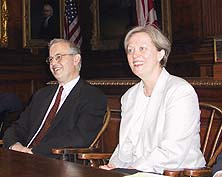Professor named 19th president
Princeton NJ -- Shirley Tilghman, a member of the Princeton faculty since 1986, an exceptional teacher, and a world-renowned scholar and leader in the field of molecular biology, was elected the University's 19th president at a special meeting May 5 of the Board of Trustees.
|
|
|
|
|
President Harold T. Shapiro and President-elect Shirley M. Caldwell Tilghman at the press conference Saturday May 5.
|
Tilghman was elected upon the "unanimous and more than enthusiastic" recommendation of a search committee composed of trustees, faculty members, students and staff, according to Robert Rawson Jr., chair of the trustees' executive committee and of the search committee.
"Dr. Tilghman epitomizes Princeton's fundamental commitments to scholarship, teaching and service to others," Rawson said. "Her character and her outstanding human qualities have made her a valued colleague among her peers and an inspiration to her students. We considered many excellent candidates, but as we move forward into this new century, Dr. Tilghman seems to us the ideal person to lead this University and to inspire all of us in the Princeton family to join with her in enhancing Princeton's many contributions to higher education, to research and to society at large."
Shapiro described the appointment as "a distinctive and wonderful moment in Princeton's history. Professor Tilghman is an eminent scholar and teacher, and is certain to lead Princeton into a new era of achievement and distinction," he said. "Princeton is fortunate indeed to have attracted a person with such broad-based commitments to the welfare of all parts of the Princeton community and to the broader world of scholarship, education and public service."
Tilghman thanked the trustees for "this opportunity to lead a university that I have come to admire greatly over these past 15 years. As the result of Harold Shapiro's leadership, the University is in extraordinarily good shape to face the new challenges and opportunities that lie ahead of us. I know that I have much to learn over the coming months, but I also know that I can depend on the advice and counsel of all members of the Princeton community, from our faculty, staff and students here on campus to the trustees and alumni family."
Tilghman joined the Princeton faculty in 1986 as the Howard Prior Professor of the Life Sciences (see box on page 5). In 1998 she took on additional responsibilities as the founding director of Princeton's multi-disciplinary Lewis-Sigler Institute for Integrative Genomics.
The institute's broad interdisciplinary mission -- to study fundamental biological problems that depend on taking large amounts of information about genes, proteins or structures and revealing how they are integrated into a coherent whole -- grew out of Tilghman's role as one of the architects of the national effort to map the entire human genome. Her own academic work has focused on mammalian genetics, in particular the role that genes play in the development of the mammalian embryo.
Tilghman is renowned not only for her pioneering research, but for her national leadership on behalf of women in science and for promoting efforts to make the early careers of young scientists as meaningful and productive as possible. She received national attention for a report on "Trends in the Careers of Life Scientists" that was issued in 1998 by a committee she chaired for the National Research Council, and she has helped launch the careers of many scholars as a member of the Pew Charitable Trusts Scholars Program in the Biomedical Sciences Selection Committee and the Lucille Markey Charitable Trust Scholar Selection Committee.
From 1993 through 2000, Tilghman chaired Princeton's Council on Science and Technology, which encourages the teaching of science and technology to students outside the sciences, and in 1996 she received Princeton's President's Award for Distinguished Teaching. Her teaching has ranged from first-year undergraduates to postdoctoral students. In 1993 she taught one of Princeton's first science-based freshman seminars and several years later she began teaching a special science course for freshmen and sophomores who were not planning to major in the sciences. She has taught molecular biology core courses for both undergraduates and graduate students. She also initiated the Princeton Postdoctoral Teaching Fellowship, a program across all the science and engineering disciplines that brings postdoctoral students to Princeton each year to gain experience in both research and teaching.
Tilghman has participated in teaching and other programs
for alumni. She led, with civil engineering Professor David
Billington, an alumni studies program on "Science and
Technology in the Liberal Arts Curriculum"; taught an alumni
college on behavioral genetics; and will be leading a
program on the human genome project later this spring for
the class of 1943. She has given more than a dozen on-campus
talks for alumni on Alumni Day, at Reunions and on other
occasions, and over recent years has traveled to speak with
alumni in cities across the country.
top
|
[an error occurred while processing this directive] |
